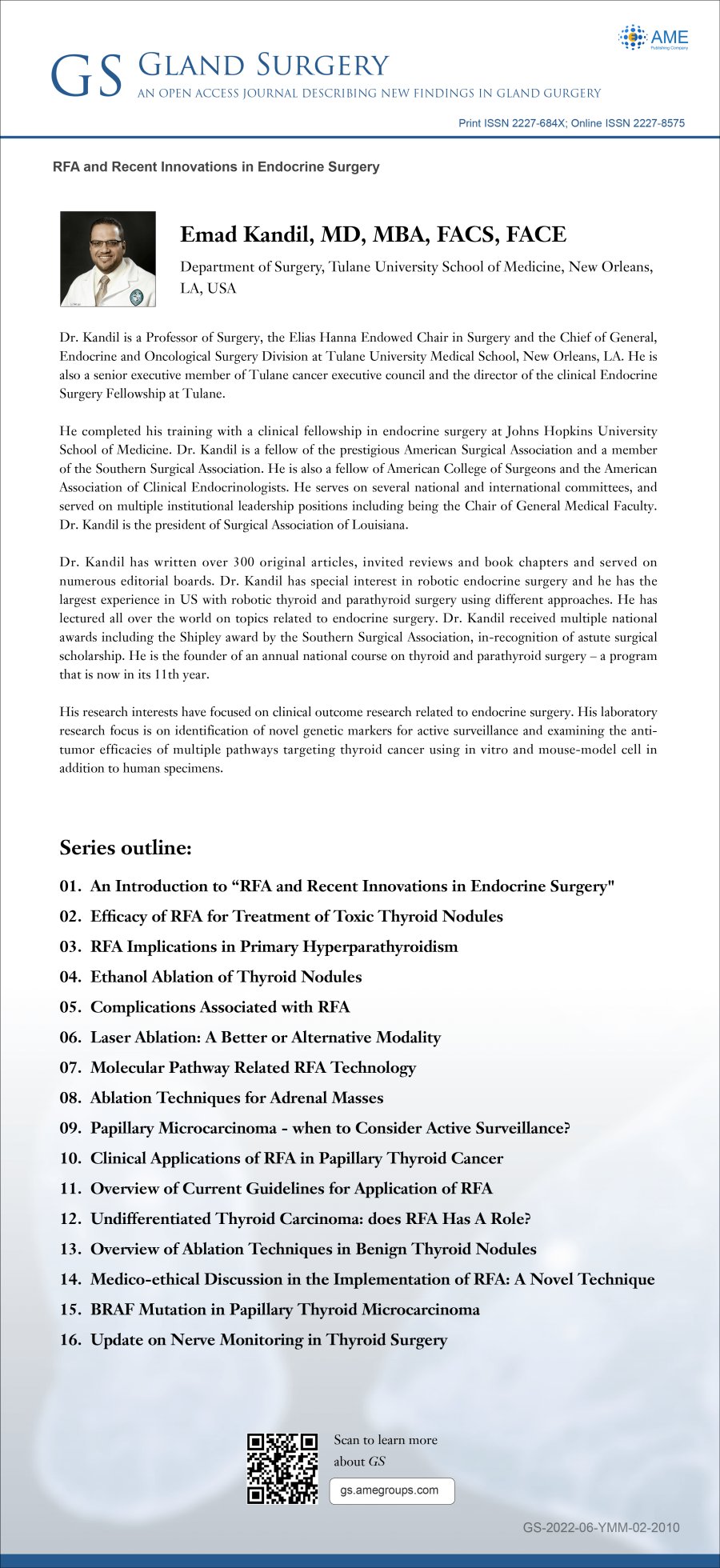
This special series on “RFA and Recent Innovations in Endocrine Surgery” is edited by Dr. Emad Kandil, from the Tulane University School of Medicine, New Orleans, LA, USA.
Emad Kandil
Department of Surgery, Tulane University School of Medicine, New Orleans, LA, USA.
Dr. Kandil is a Professor of Surgery, the Elias Hanna Endowed Chair in Surgery and the Chief of General, Endocrine and Oncological Surgery Division at Tulane University Medical School, New Orleans, LA. He is also a senior executive member of Tulane cancer executive council and the director of the clinical Endocrine Surgery Fellowship at Tulane.
He completed his training with a clinical fellowship in endocrine surgery at Johns Hopkins University School of Medicine. Dr. Kandil is a fellow of the prestigious American Surgical Association and a member of the Southern Surgical Association. He is also a fellow of American College of Surgeons and the American Association of Clinical Endocrinologists. He serves on several national and international committees, and served on multiple institutional leadership positions including being the Chair of General Medical Faculty. Dr. Kandil is the president of Surgical Association of Louisiana.
Dr. Kandil has written over 300 original articles, invited reviews and book chapters and served on numerous editorial boards. Dr. Kandil has special interest in robotic endocrine surgery and he has the largest experience in US with robotic thyroid and parathyroid surgery using different approaches. He has lectured all over the world on topics related to endocrine surgery. Dr. Kandil received multiple national awards including the Shipley award by the Southern Surgical Association, in-recognition of astute surgical scholarship. He is the founder of an annual national course on thyroid and parathyroid surgery – a program that is now in its 11th year.
His research interests have focused on clinical outcome research related to endocrine surgery. His laboratory research focus is on identification of novel genetic markers for active surveillance and examining the anti-tumor efficacies of multiple pathways targeting thyroid cancer using in vitro and mouse-model cell in addition to human specimens.
Series outline:
01. An Introduction to “RFA and Recent Innovations in Endocrine Surgery"
02. Efficacy of RFA for Treatment of Toxic Thyroid Nodules
03. RFA Implications in Primary Hyperparathyroidism
04. Ethanol Ablation of Thyroid Nodules
05. Complications Associated with RFA
06. Laser Ablation: A Better or Alternative Modality
07. Molecular Pathway Related RFA Technology
08. Ablation Techniques for Adrenal Masses
09. Papillary Microcarcinoma - when to Consider Active Surveillance?
10. Clinical Applications of RFA in Papillary Thyroid Cancer
11. Overview of Current Guidelines for Application of RFA
12. Undifferentiated Thyroid Carcinoma: does RFA Has A Role?
13. Overview of Ablation Techniques in Benign Thyroid Nodules
14. Medico-ethical Discussion in the Implementation of RFA: A Novel Technique
15. BRAF Mutation in Papillary Thyroid Microcarcinoma
16. Update on Nerve Monitoring in Thyroid Surgery
Disclosure:
The special series “RFA and Recent Innovations in Endocrine Surgery” was commissioned by the editorial office, Gland Surgery without any sponsorship or funding. Emad Kandil is serving as the unpaid Editor for the special series.
